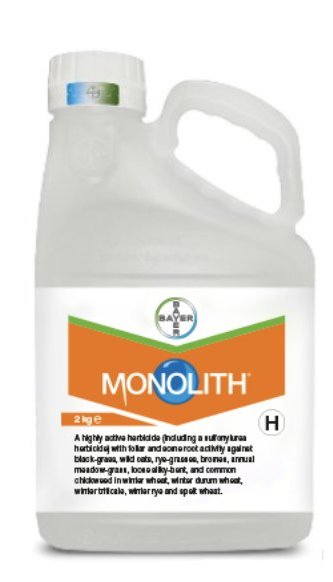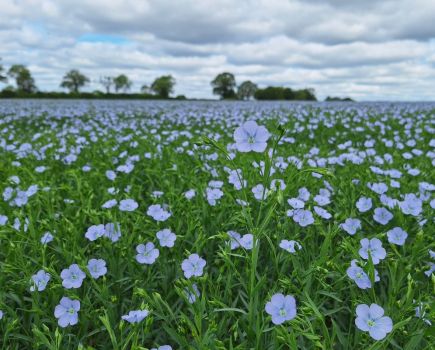
A new blackgrass herbicide from Bayer will be available to growers this coming spring. Meanwhile, off-patent crop protection company Life Scientific has launched the first commercially available, off-patent mesosulfuron and iodosulfuron herbicides Niantic and Cintac to the UK arable market.
Monolith (mesosulfuron+ propoxycarbazone) boasts superior and more consistent levels of blackgrass control in winter wheat crops, believes Bayer’s Ben Coombs.
Monolith gives a significant step up in blackgrass control compared with its predecessor Atlantis (mesosulfuron+ iodosulfuron), he says. In trials, it provided an average of 10% more control of blackgrass than Atlantis. The trial results also show that Monolith is more consistent and overall control never dipped below 50% with Monolith.
In 19 comparative trials, the control from Monolith ranged from 53–95%, while for Atlantis it was 16–94%. All trials took place in fields with blackgrass problems and reflect the kind of blackgrass populations farmers have to deal with, including those with resistance.
“Atlantis performance has declined so growers will want to know how Monolith changes the situation,” explains Ben. “The trial results already show it outperforms Atlantis for control and consistency on difficult populations. Secondly, the chemical composition of Monolith has two actives with grassweed activity that support each other.”

In trials, Monolith provided an average of 10% more control of blackgrass than Atlantis.
Ben clarifies that if target site resistance is a problem then there won’t be any difference in performance than Atlantis, but he points out that mixed populations of blackgrass always exist in the field and that for any that have EMR resistance, Monolith will give this uplift in performance.
Monolith combines mesosulfuron which is found in Atlantis and propoxycarbazone, the active ingredient in Attribut. Formulated together they make a very potent tool for controlling blackgrass and other common grassweeds such as brome, ryegrass and wild oats, notes Ben.
“The grassweed-only combination means growers can better target broadleaf weed control where it’s needed. It’s really important to use Monolith as part of a full programme of cultural controls and varied actives to help protect the product and to ensure the best results.”
Monolith is for spring application in winter wheat crops. It can be applied from 1 Feb and when the crop is at the first tiller stage until 2nd node detectable (GS21–32). Apart from the timing restrictions, application advice is similar to other Bayer post-emergence herbicides such as Atlantis WG.
“Herbicide uptake is by blackgrass leaves, so it’s essential to have active growth when it’s applied. It‘s also more effective at earlier growth stages of grassweeds, so should be applied as soon as conditions allow. Monolith should be applied as a fine spray at a water volume 200 l/ha and mixed with the adjuvant biopower (1 l/ha),” he adds.
While he appreciates growers aren’t likely to switch all their post-em programme to the new herbicide in one season, Ben is keen for farmers to try out the new herbicide which will be available at a slight premium to Atlantis. “For this season, we’d really encourage farmers to try Monolith on a few of their fields,” he concludes.
Exact copy
The two new products from Life Scientific are claimed to be exact copies of Bayer’s older blackgrass products for which the patent expired last month. Niantic is essentially Atlantis – a post-em early season applied herbicide for controlling grass and broadleaf weeds in winter wheat. Cintac, like Bayer’s Pacifica, has a slightly higher iodosulfuron content and is a post-em spring-applied herbicide for controlling grass and broadleaf weeds in winter wheat. Both products will be commercially available through distribution partners ProCam and Hutchinsons in Jan 2018.
The off-patent products have been brought to market faster than has been previously possible. So how has this been achieved?

Life Scientific’s approach is based around the ability to reverse engineer a product from the original, says Bill Lankford.
“We believe our approach is unique within the crop protection industry,” explains Life Scientific UK country manager, Bill Lankford. “It’s based on a very strong scientific concept around the ability to reverse engineer a product from the original, meaning that the resulting product is accepted as comparable by the regulatory authority.”
The products have full generic registration, he stresses, making them distinct from parallel imports. “The only fundamental difference to the original reference products is price; ours will cost less than the brand leader.”
The approach has been used in other industries, such as computing with companies like Dell, Compaq and others producing clones of IBM computers, points out Life Scientific CEO Nicola Mitchell.
“Through 20 years of specialising, we have built a unique capability in off-patent science, which means we can be innovative in all aspects of product development, and in all markets,” she says.
“Our scientists avoid reinventing the wheel. This allows us to get to market first, without ever compromising on quality.”
Based in Dublin, specialised teams focus on identifying the components of the original product, sourcing the formulation components on the global market, reconstructing the reference product in an identical form and obtaining off-patent registrations.
“As the formulation is identical to the original, our products are approved on comparability,” adds Nicola. The company now has 17 of these approvals, of which eight are available in 2018. Azoxystar (azoxystrobin) and Lambdastar (lambda-cyhalothrin) are already in the market. Other products include Basilico (mesotrione), Kipota (clodinafop), Ovarb (chlorothalonil) and Sumir (florasulam).

Nicola Mitchell has spent 20 years building a specialist capability in off-patent science.
Niantic is ideally applied in the autumn at 0.4kg/ha to small, actively growing weeds and provides good control of blackgrass, ryegrass, wild oats, meadow grasses, common chickweed and mayweeds in winter wheat. Cintac is a spring applied herbicide with a choice of two rates depending on target weeds, and can also be used up to crop growth stage 39. At the highest rate of 0.5kg/ha, it offers control of brome species as well as some key broadleaf weed species
For blackgrass control, both products should always be used as part of a programme with residual herbicides, and will be as effective as Atlantis where ALS-resistant weeds are a problem. They should always be used in mixture with an approved adjuvant, and are physically compatible with commonly used herbicides, fungicides and insecticides, says Life Scientific R&D portfolio manager, Richard Brereton.
“We will be working closely with industry partners to trial both products in the field going forward,” he says.




